Wyckoff Gardens Residents Demand Answers To Water Shut-Off At Fair Housing Meeting
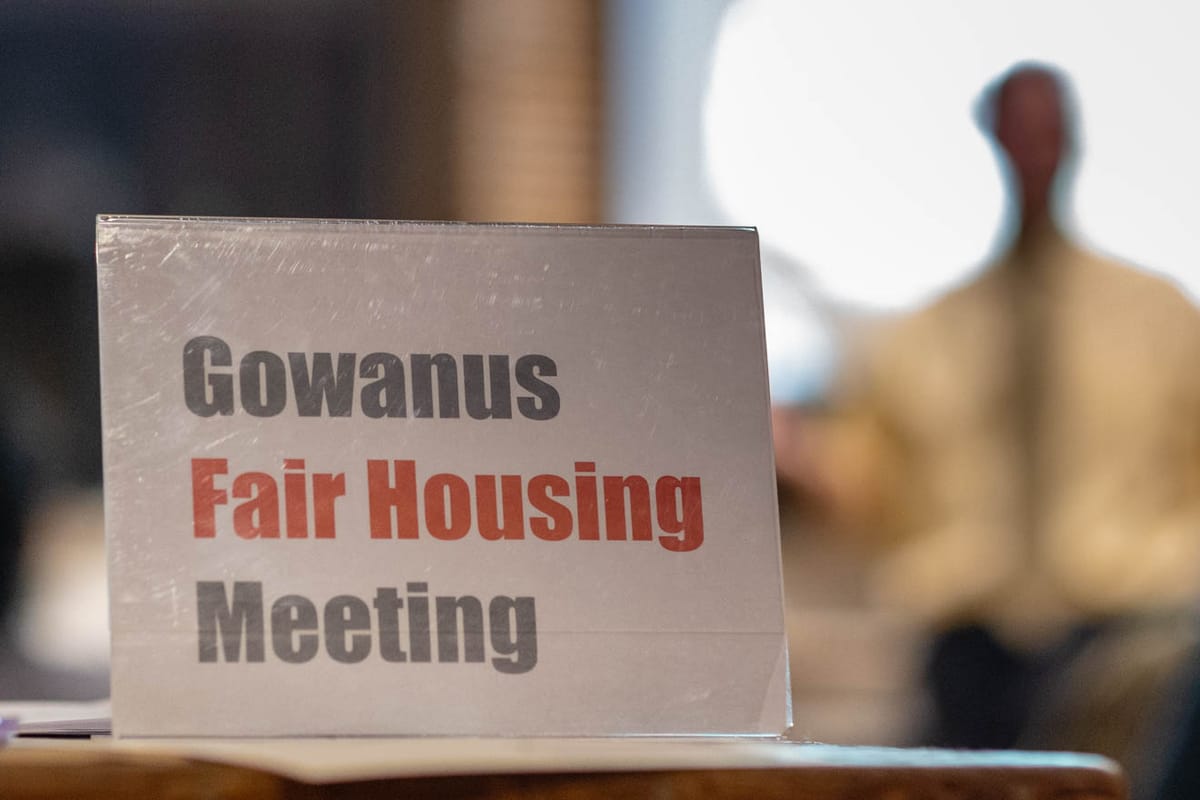
GOWANUS – Tuesday evening, at the start of a meeting to discuss Fair Housing in Gowanus, local NYCHA residents demanded answers from officials explaining why Wyckoff Gardens was without water for several hours on Sunday and again on Monday morning.
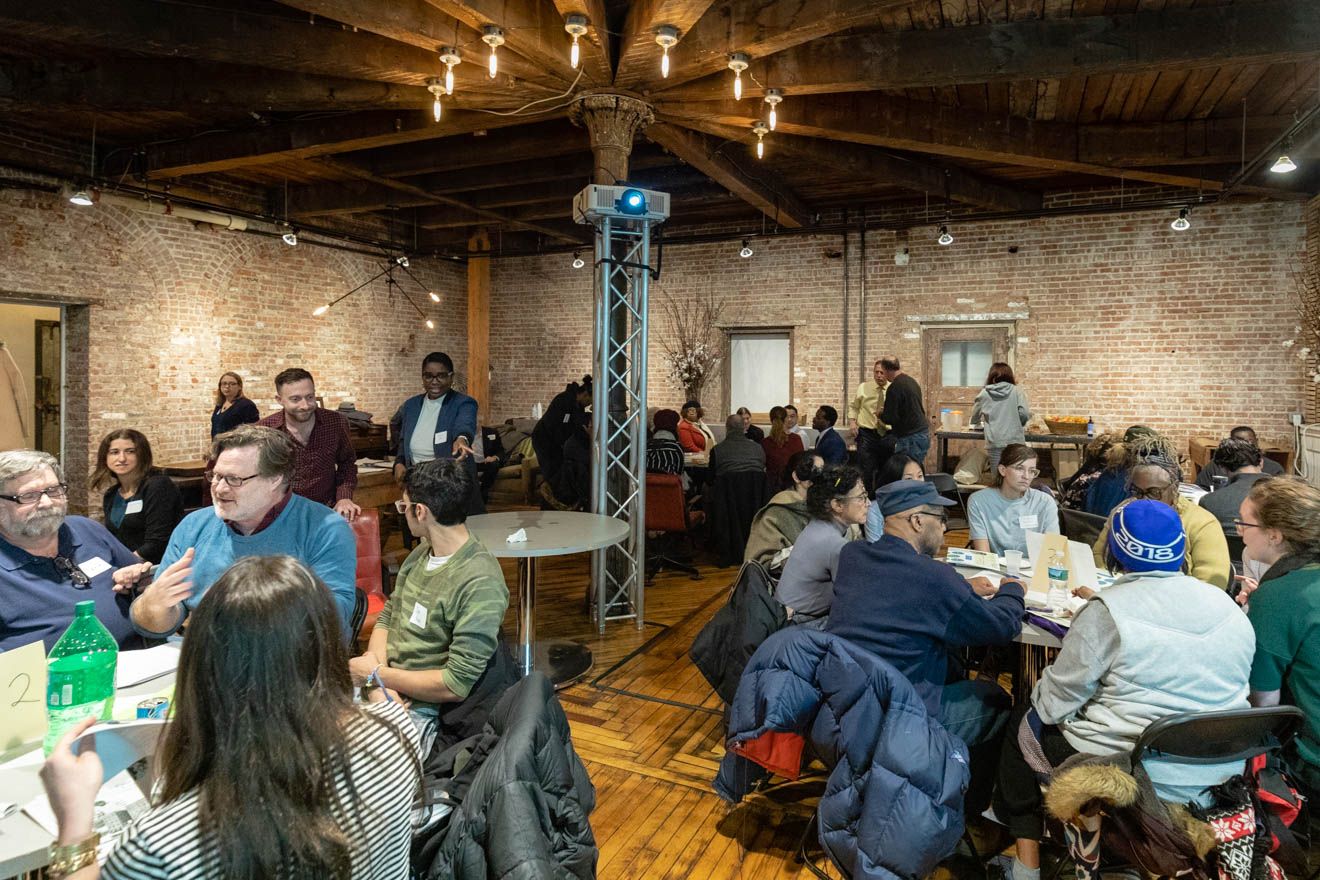
“The fact that they had no water and there’s nobody explaining why there was no water—that’s a big issue,” said Karen Blondel, a resident of the Red Hook Houses. “We come out to all of these meetings. We’re always involved, and we get nothing,” she added.
“We live in public housing, so we go from too much heat to no heat. For three to four days we’re in there dying, we can’t breathe because they have the heat so high. Then the weekend comes, they shut it off, and there’s nobody we can call, nobody’s responding,” she continued. While Blondel lives at the Red Hook Houses, she said residents of the Wyckoff, Gowanus, and Warren Street public housing developments all endure the same conditions.
“The whole Thanksgiving I’m looking at people with no heat and then, to turn around, no water?” she asked frustrated.
She explained that all of the buildings in the Wyckoff Houses development lost water service on Sunday, then lost it again after it was fixed from Monday evening until Tuesday afternoon.
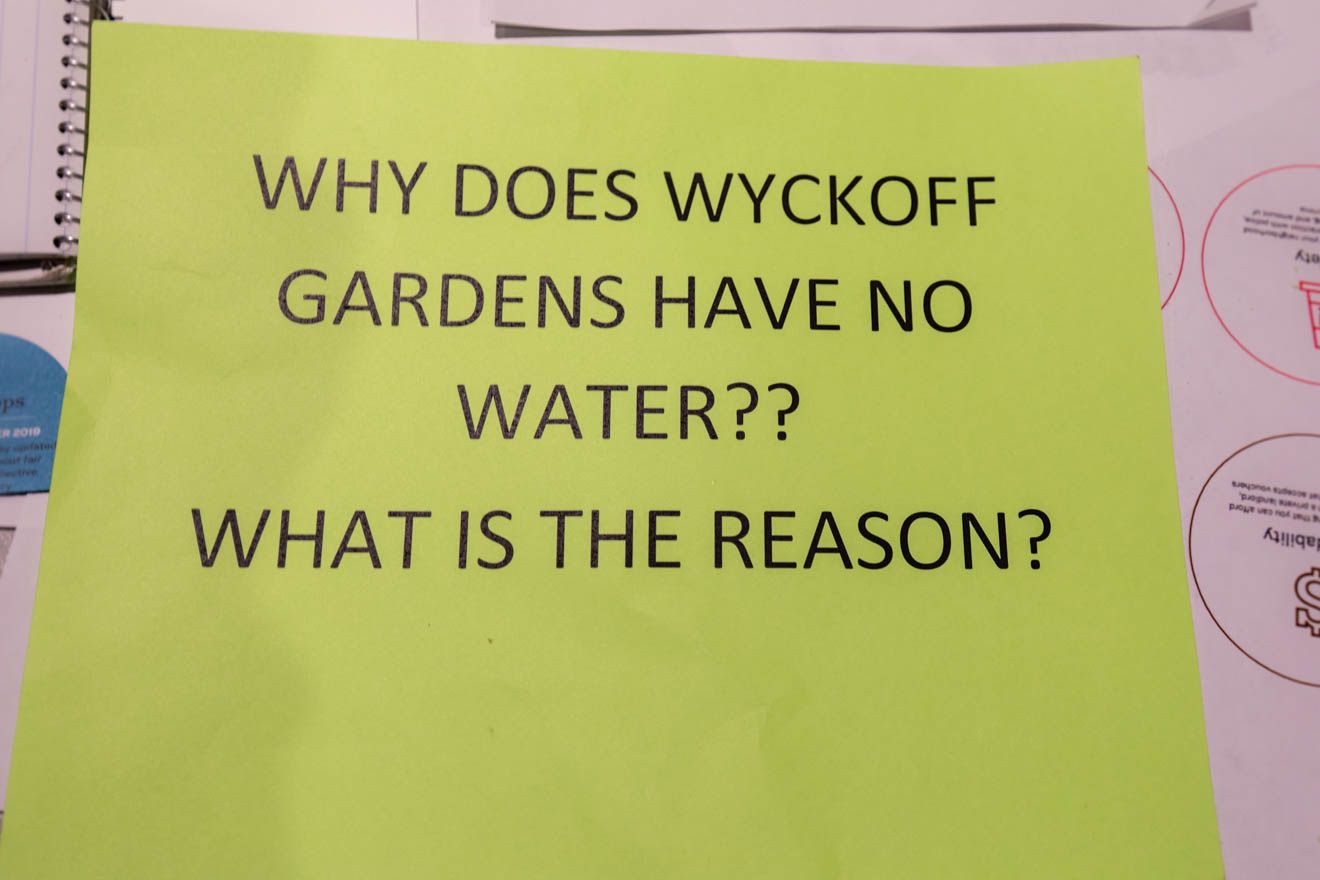
The group descended on Council Member Brad Lander when he arrived at the Old American Can Factory (232 3rd Street) where the Fair Housing in Gowanus meeting was held. Lander quickly called NYCHA Executive Vice President for External Affairs David Pristin and put him on speaker phone with Blondel and other NYCHA residents waiting for information.
One of the pumps was broken, Bklyner overheard him say. “This is one of the issues of the aging infrastructure,” he added.
“This is really disrespectful and we need something in writing saying what happened and how it’s not going to happen again,” Blondel demanded. “You need to sit down with the residents…and you need to hash out what the real priorities are in these developments,” she told Pristin.
As he started the meeting, Lander explained the situation to all attendees. “I do want to acknowledge the very thirsty and cold elephant in the room of the issue of water at Wyckoff.,” he said. “We were just doing a little emergency management. Dave Pristin of NYCHA was on the phone explaining what happened today and why the water was out. I don’t think the answers are very satisfying…but he did at least give us information.”

“There were a couple of broken pumps that pump the water up to the top so it can flow down. Those pumps are old, they broke. It sounds like they’ve been defective a while and that they’ve been going out intermittently—that probably is a good argument that they should have been replaced when they were going out intermittently, before they went out and caused the problems to the buildings…. They were replaced mid-afternoon. That was cold comfort if you were trying to take a shower or cook anytime today between this morning when you woke up and mid-afternoon,” he said.
The Council Member added that the development’s backup pump was also broken. “They now have the primary pump fixed and are working on getting the backup pump fixed.”
Some were still skeptical. “Water usually has its own pressure that can push it up,” said Blondel in response to NYCHA’s explanation. “That doesn’t make sense to me. There’s something really weird about this.”
Benjamin Solotaire, a representative for Council Member Stephen Levin whose District 33 covers the Wyckoff Gardens development, told Bklyner that he learned about the water outage on Twitter Tuesday morning. Solotaire immediately contacted NYCHA and Council Member Levin went to the site at approximately 1pm that day at which point the problem had already been fixed. He noted that the Council Member would talk to NYCHA General Manager and COO Vito Mustaciulo on Wednesday about the matter.
Lander noted that the Wyckoff Gardens water shutoff was “very germane” to “the set of issues” that were up for discussion at the meeting. “It’s not lost on anybody in this room—the challenges and problems facing the residents of the New York City Housing Authority who are overwhelmingly people of color and who just want to live in decent housing that has heat and hot water, working elevators, and conditions like everybody else. Our city and NYCHA are not providing that,” he said.
“We are going to try tonight to balance some understanding that I think will be informed not only by some history but by very real lived experience and anger about what that looks like…with some thinking about how we might work to change it,” he added.
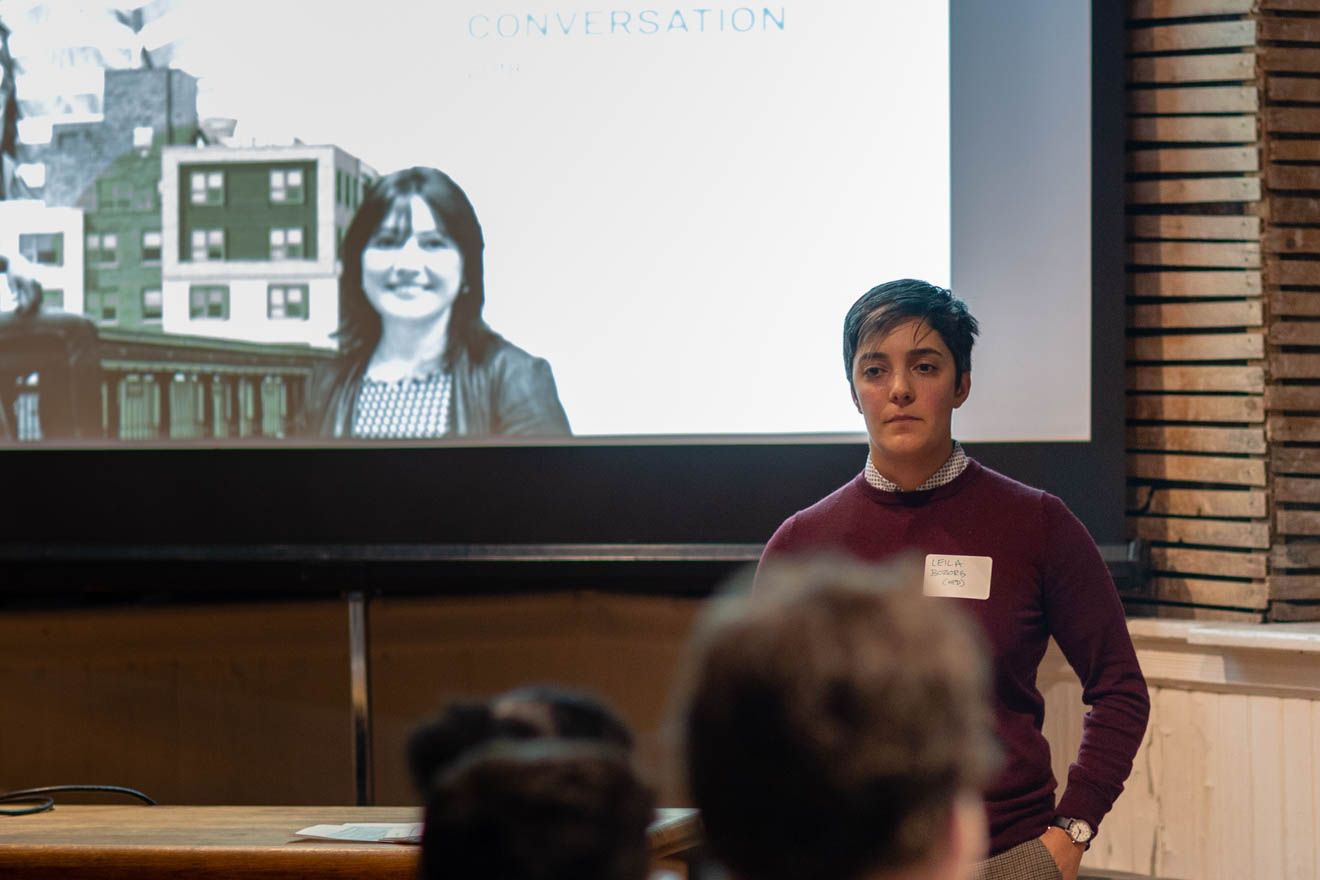
“This conversation is part of our ‘Where We Live NYC‘ process which is really our effort to—over a course of a year—come up with a new set of fair housing policies for the entire city of New York,” explained Leila Bozorg, Deputy Commissioner of Neighborhood Strategies for the NYC Department of Housing Preservation and Development (HPD). “Those are policies that allow us to confront the legacy of segregation in this city, to continue to fight discrimination and find ways to fight discrimination more effectively, but also to come up with new policies that truly help to advance what we call ‘access to opportunity’.” Access to opportunity includes “access to safe, decent, quality housing,” Bozorg added.
The process involves “extensive public engagement,” she continued, as well as data and policy analysis at HPD and dozens of other city agencies. The public engagement will also include a digital engagement tool kit which will be available online in January. New Yorkers will be able to download the tool kit and use it to help them have conversations about fair housing issues, then share their feedback with HPD to help inform policy-making.
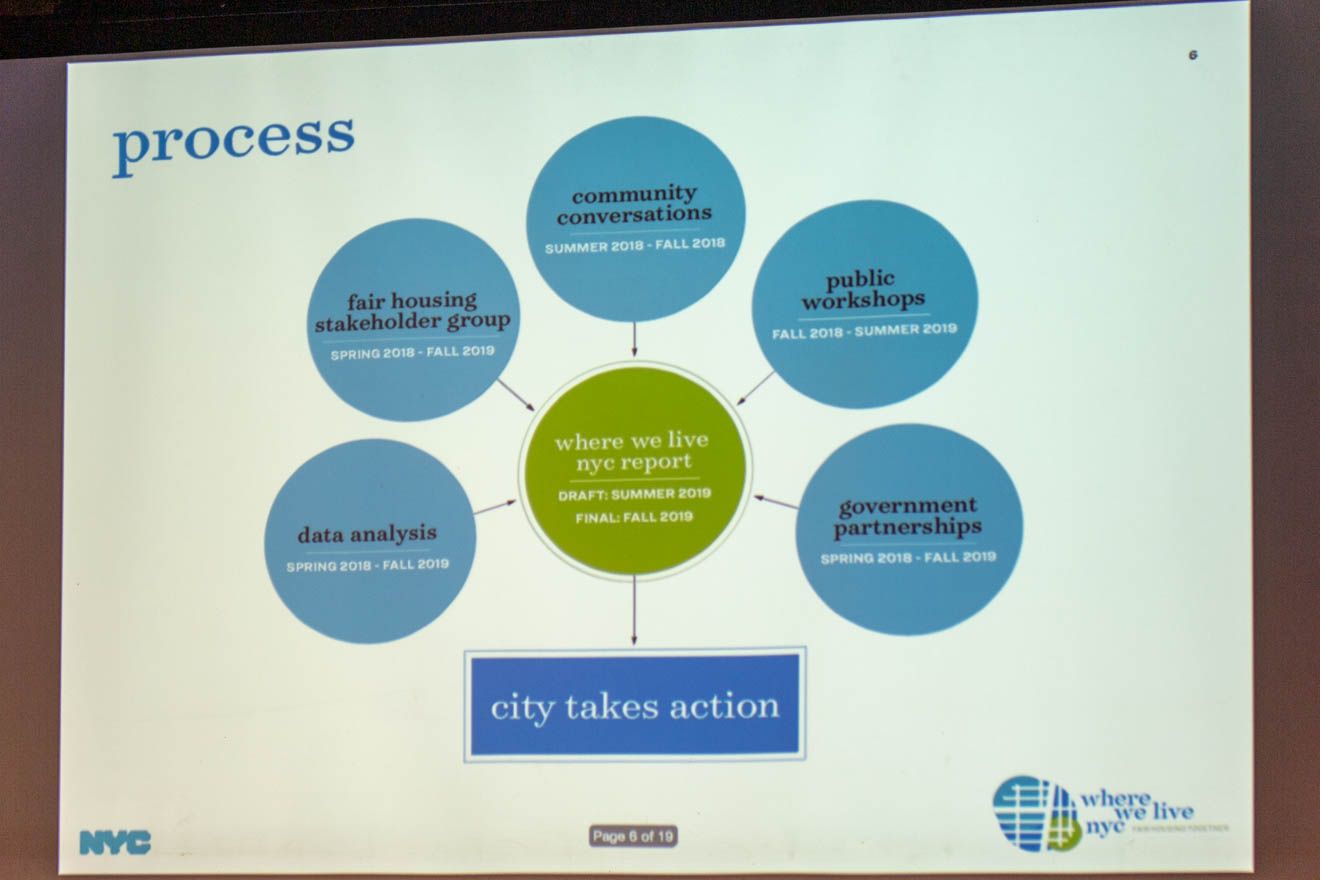
Lulu Mickelson, Fair Housing Engagement Manager for HPD, then gave a presentation based on the agency’s tool kit. “Fair housing is your right to find housing free of discrimination when you’re renting, buying, or trying to get financing for a home,” she explained, noting some of the populations (based on race, sex, disability, gender identity, religion, etc.) protected by the fair housing law.
“The 1968 Fair Housing Act required cities to affirmatively further fair housing,” Mickelson explained. “The city of New York’s answer to that question of what is our requirement to affirmatively further fair housing is Where We Live NYC,” she continued, stating, “It has a two-part mandate: make sure all New Yorkers have housing choice, the choice to live in the neighborhoods that they want to live in, but that also every neighborhood is a neighborhood of opportunity.”
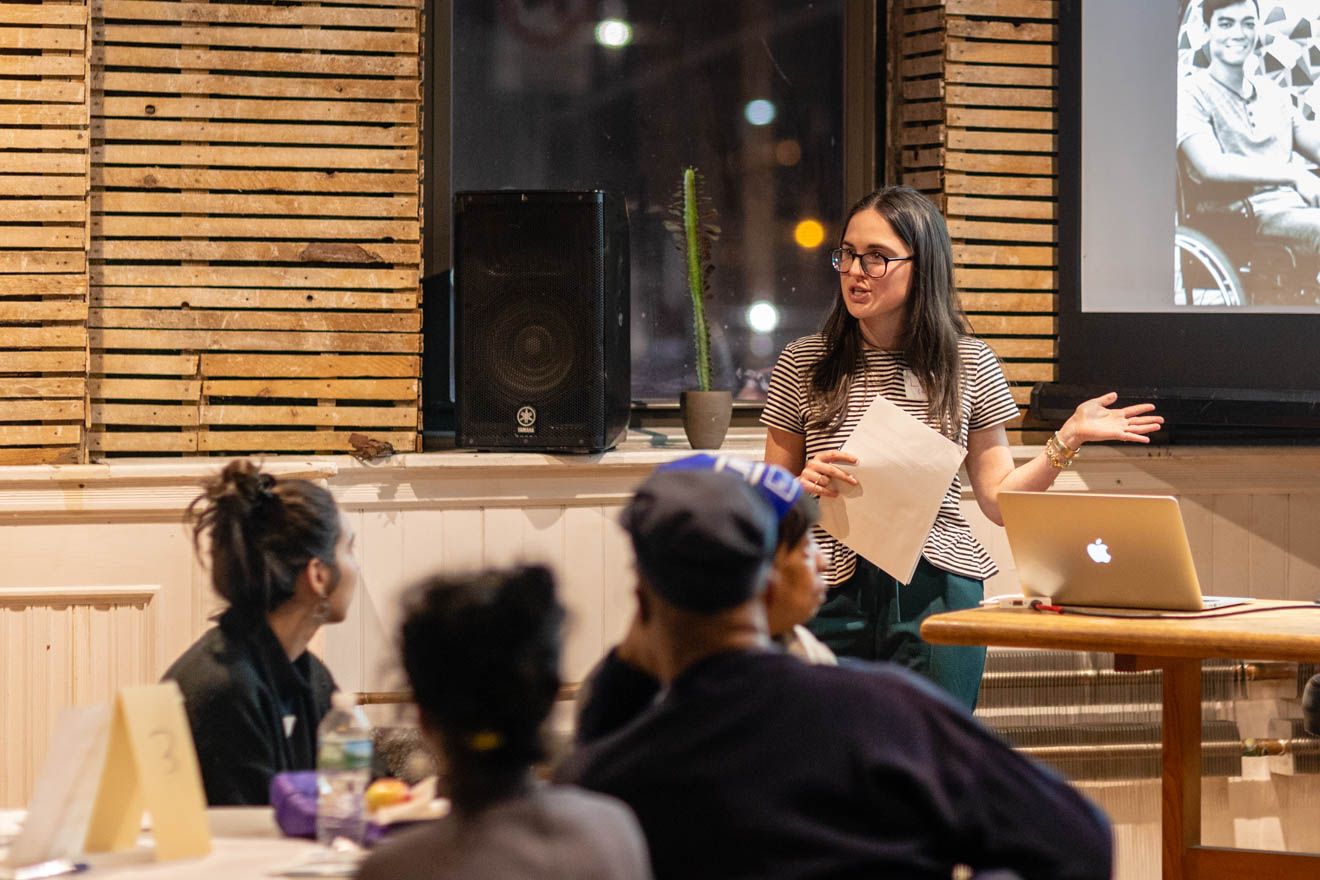
Mickelson explained that the goals of “Where We Live NYC” include confronting segregation, fighting discrimination, and taking action to advance opportunity for everyone. She added that the need for the Fair Housing program is due to “the history of segregation and discrimination hav[ing] real and lasting consequences for the health, wealth, and opportunity of our nation and…our communities. It also matters because all New Yorkers should have the opportunity to live in a safe, welcoming place with access to affordable housing, great schools, parks, transit, stores, and positive, healthy, reliable housing conditions.”
Meeting attendees then split up into break-out groups to discuss their thoughts on Gowanus today and their visions for fair housing in the future.
Regarding Gowanus’ current makeup, Blondel commented, “I have a very diverse community, but we’re not integrated. My community has people from all over the world in it, but we don’t go to the same church on Sunday, we don’t shop in the same stores. Even though we live together, we’re still not integrated. We don’t deal with community issues together.”
“Public housing is a great one to start with,” she continued. “We have a tenant association that’s supposed to represent all public housing residents, yet they don’t have anything but the English language available at these meetings.”
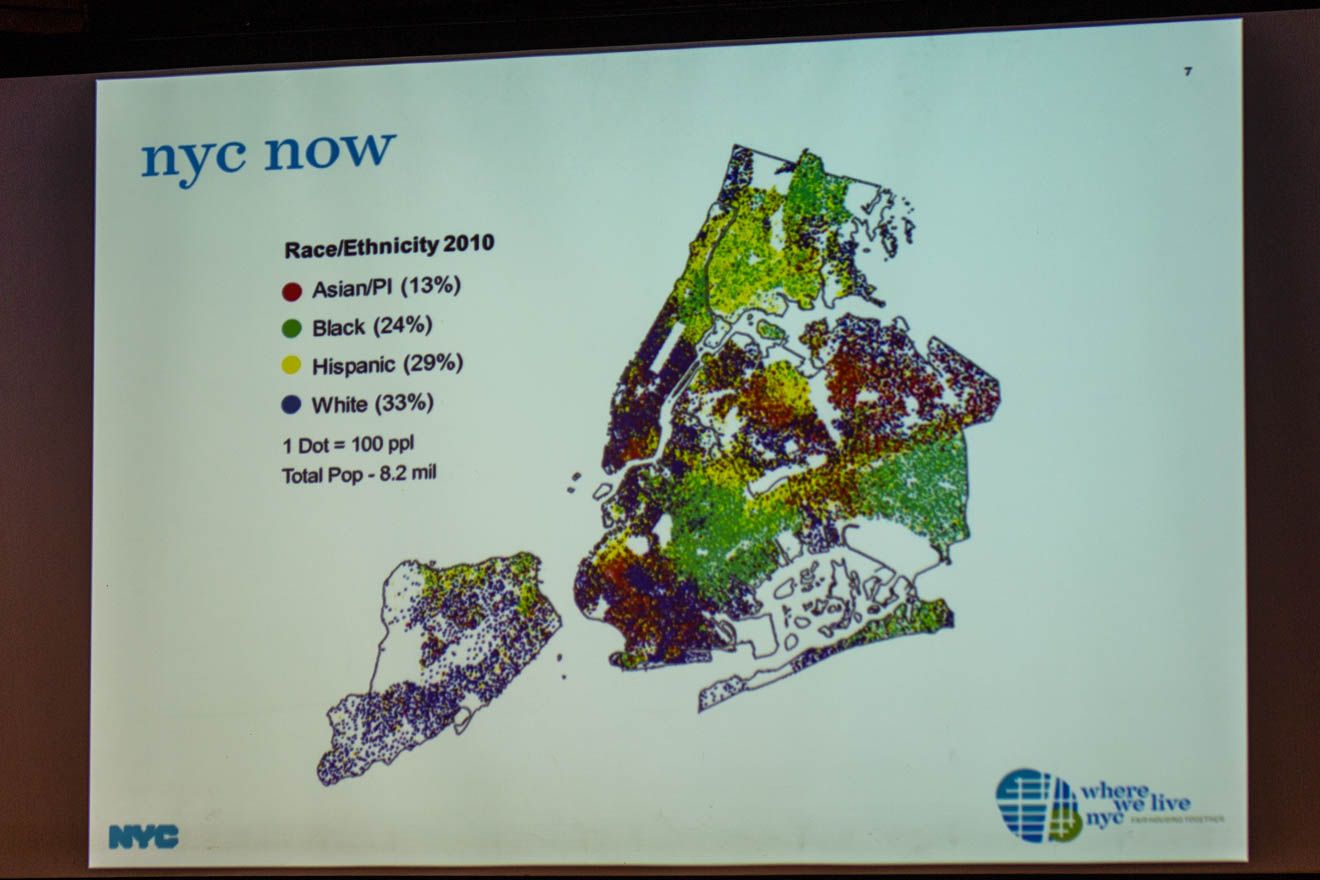
Carolyn Ferguson, a resident of the Gowanus Houses, agreed. “Even at meetings like this, we’re always coming out into these areas…but they don’t hold the meetings inside the projects.” Ferguson noted that more public housing residents would attend Gowanus visioning meetings if they were held at venues more convenient to them.
Sam Vasen, a Brooklyn Tech student and Gowanus resident, commented on diversity at school. “You can have a diverse school and when you walk through the hallways you see people from many different backgrounds, but when you walk into the cafeteria and you see who sits where, that’s not integration.” Vasen added that a school can change its demographics, but “if there’s not fair treatment and there’s still separation, that’s not equality.”
“It’s not a bad thing to be integrated and it’s not a bad thing to be separated, but what the bad thing is is that when we all pay our fair share and we’re not getting the equal things,” Ferguson added. “Like if your school has good books and computers, and I’m paying taxes as well, my children should have good books and computers in their class—like your kid should get the Apple and my kids should get the Dells that are five years old…. When things are really equal, people don’t really pay attention to being separated…. It gets noticeable when you see that you’re being denied things that other people have,” she said.
Another difficulty Gowanus public housing residents face is the loss of affordable resources in the neighborhood. Ferguson, who has lived at the Gowanus Houses for 30 years, said, “When I first moved here, we had more laundromats, we had the choice of two supermarkets, either Met Foods on Smith Street or C-Town on Bond Street. It’s just those little quality of life things that helped us stay.”
With small businesses being pushed out of the area, she notes, “There’s nothing around here that I can afford…or I can afford but you’re rubbing two quarters together. It’s not fair. We don’t even have clinics close by. There are more veterinarians.”
Vasen agreed with her adding that he hopes the future Gowanus will offer more “accessibility to basic resources that are not just three Union Markets” so locals won’t have to “walk 20 minutes to the nearest affordable supermarket.”
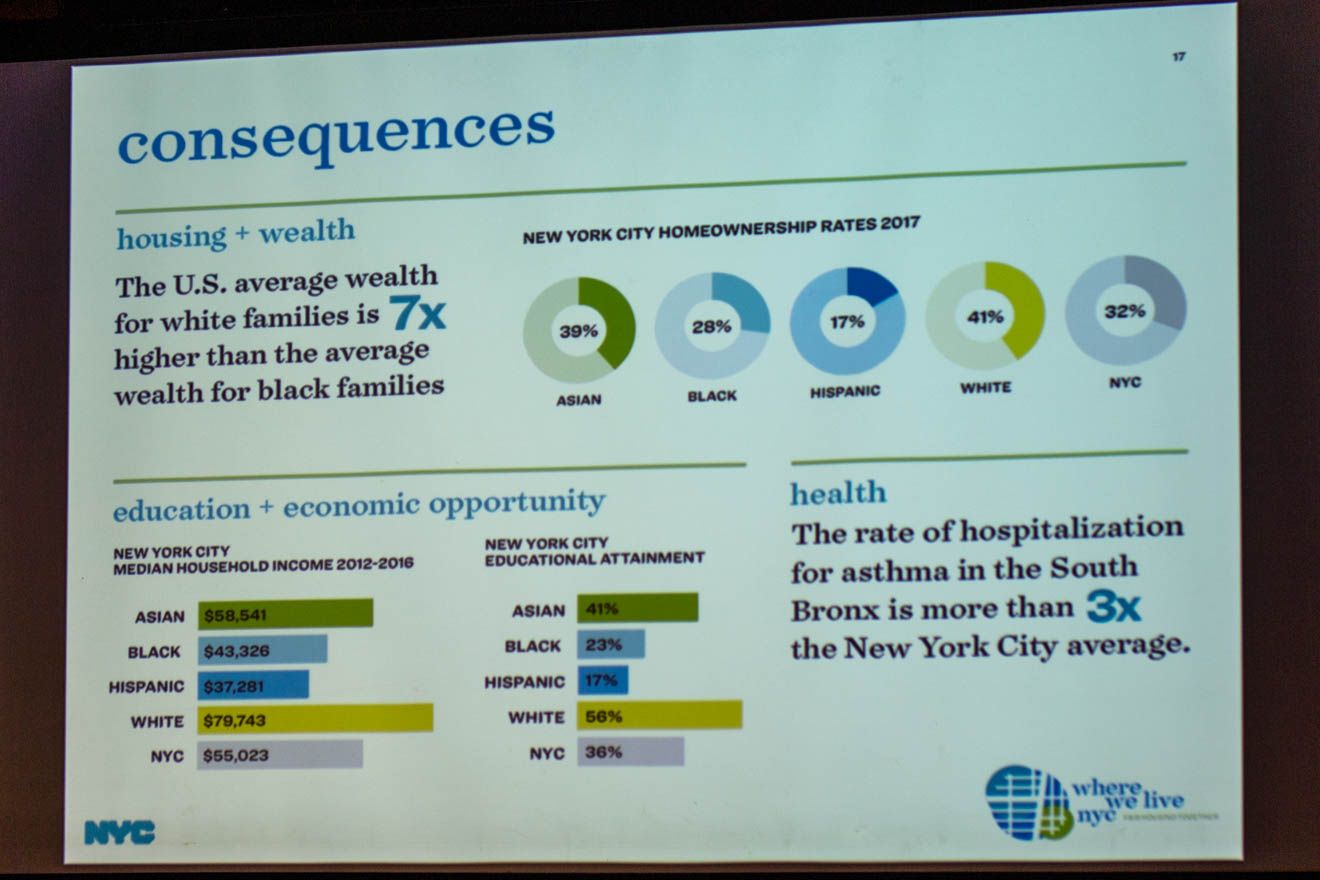
Ferguson also noted that as investment continues to come into Gowanus, the area’s public housing developments should receive some of the benefits. She suggested that a grant or funding be provided to local low-income residents so they can invest in businesses that serve their community. The Brooklyn Navy Yard Development Corporation recently launched Local Bites, a program that provides temporary retail space to graduates of the Food Business Pathways program, an entrepreneurial program that supports NYCHA residents who want to start food-oriented businesses.
When the discussion turned to Gowanus’ outdoor spaces, Ferguson said, “On our side, where the projects are, there’s nothing developed over there. There are no benches. There’s not enough light. There are no trees planted there.” She added that “beautification” projects and the development of new green space tends to be “one-sided” and is typically planned “further towards Park Slope instead of being equally divided. They should also come towards Gowanus Houses.”
Apart from aesthetics, the equal distribution of green space is important because residents tend to meet a more diverse set of neighbors at outdoor activities, including expos, barbecues, and arts and cultural events. “Definitely the arts part in the area is a big bridge,” Blondel noted.
Perhaps the urgency of fair housing in Gowanus was best highlighted by Ferguson who said, “If I had my choice I would probably leave Gowanus. It’s not affordable.” She said one of her goals is to own a house some day, and the neighborhood does not support her dream. “If I was to stay in the projects in Gowanus, I would need to see [NYCHA] come in here and tear down the walls, get rid of the mold, put new pipes in, put new floors in. Those buildings are old.” The water outage at Wyckoff Gardens this week only reinforced Ferguson’s argument.
“This is a hard set of topics,” Council Member Lander told Bklyner at the end of the meeting. “People tonight wanted to be part of the conversation. I heard a lot of serious dialogue.”
“I do feel optimistic about our work for the planning for Gowanus,” he said. “We will work harder to make sure that these issues are infused into all of the other work that we’re doing. We aren’t done.”



